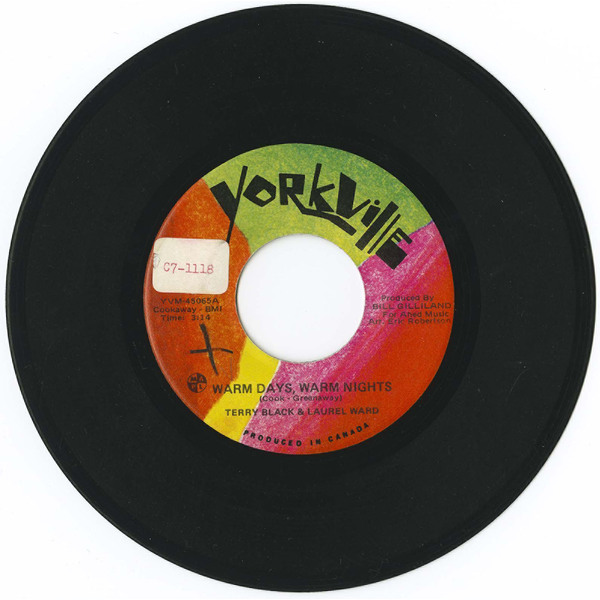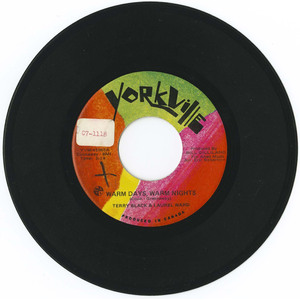Information/Write-up
Black & Ward was the soulful Canadian duo of Terry Black and Laurel Ward, a Toronto-based pair whose musical and personal chemistry carried them across three decades of performances, recordings, and broadcast appearances. Blending pop, soul, and folk-rock influences with undeniable vocal charisma, their work remains a hidden treasure of Canadian music history—beloved by Northern Soul collectors and ripe for rediscovery.
Terry Black was born on February 3, 1949, in Vancouver, British Columbia. A born performer, he rose to fame at just 15 years old with the breakout hit “Unless You Care,” released on ARC Records and produced by Bill Gilliland. That single, backed with "Can't We Go Somewhere," catapulted him into Canadian teen idol status, reaching #2 on the RPM charts and earning him a spot on the 1964 Dick Clark Caravan of Stars alongside Billy J. Kramer and Gerry & The Pacemakers. Before long, he appeared on American Bandstand and was crowned RPM’s “Male Vocalist of the Year.” Between 1964 and 1966, he charted several more singles, including "Little Liar" and a cover of "Only Sixteen," and released two albums—The Black Plague and Terry Black—both stitched together from his growing catalogue of 45s.
In the late 1960s, seeking to shed his clean-cut image, Terry briefly rebranded as “Terence” and released the ambitious An Eye for an Ear, a psychedelic rock album cut in Los Angeles and released by Decca in the U.S. The record failed to make commercial impact but became a sought-after collector's item in later years.
Meanwhile, Laurel Ward, a gifted vocalist originally from Delta, Manitoba, was blazing her own trail. Discovered in high school after an appearance on Oscar Brand’s Let’s Sing Out, she relocated to Toronto and joined the coffeehouse circuit. Alongside guitarist Gordon Lowe, she released the haunting folk-psych album Prisms in 1967 on Yorkville Records—a lost classic that would later find a cult following in Asia. Laurel also caught the attention of ARC’s Bill Gilliland and Sid Dolgay of The Travellers, cementing her place in Canada’s folk renaissance.
Terry and Laurel met in 1968 during the Toronto production of Hair, where both were cast. Their creative and romantic partnership blossomed quickly. By 1971, they were recording as a duo. Their first single, “Goin’ Down (On the Road to L.A.),” recorded at George Martin’s AIR Studios in London, became a sleeper hit—cracking Billboard’s Hot 100 in the U.S. and reaching #99 in Canada by early 1972. They soon joined Doug Riley’s Dr. Music, contributing to the ensemble’s sophisticated fusion of jazz, pop, and soul, and appearing on albums and TV performances.
Black & Ward continued to record on the side, releasing singles like “Warm Days, Warm Nights” and “Love Is the Feelin’.” Their 1975 single “Back Up (Against Your Persuasion)” on RCA became their highest-charting release, peaking at #35 in Canada. Though often overlooked at the time, their RCA singles—especially the propulsive “It’s Your Love” and “Restless”—have since earned acclaim among rare soul collectors and crate-digging DJs, particularly in the UK’s Northern Soul scene.
Outside of their duo work, both Terry and Laurel were highly active in the studio. They sang jingles for commercials, performed live across Canada, and became part of Keith Hampshire’s Music Machine vocal ensemble in 1973 alongside the likes of Dianne Brooks and Sharon Lee Williams. Laurel also toured as a backing vocalist with Anne Murray, while Terry continued composing music for films, contributing the track “Moondust” to the Meatballs soundtrack in 1979.
In 1981, they reunited under the Black & Ward name for one final push, releasing a self-titled six-song EP and a solo single by Terry in 1982. Neither gained traction, and the duo gradually shifted their focus back to session work and jingle production. Though their musical output slowed, their impact remained—each a dedicated artist with a lifelong commitment to Canadian music.
Terry Black passed away in 2009 in Kamloops, British Columbia, after a long battle with multiple sclerosis. Laurel Ward died in 2014, leaving behind a rich legacy of recordings, both as a soloist and in harmony with Terry. While their commercial success may have been modest, their music endures—a rare blend of technical polish and emotional sincerity that continues to resonate with collectors and music historians alike.
Black & Ward’s legacy deserves a second look—not as a footnote, but as a soulful thread in the fabric of Canadian popular music.
-Robert Williston



No Comments